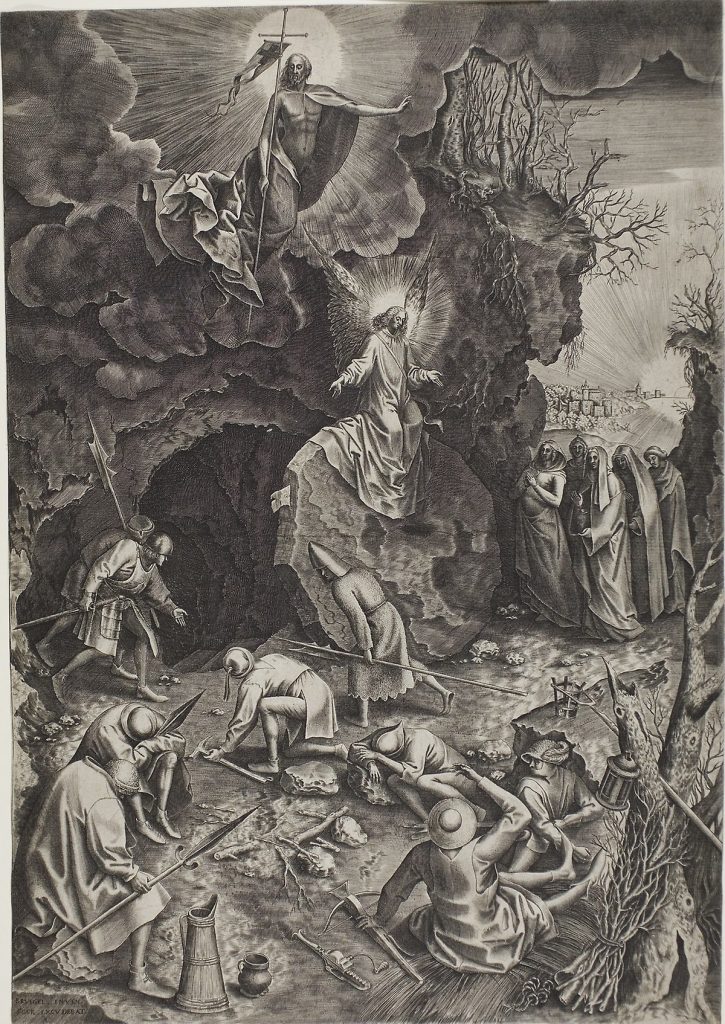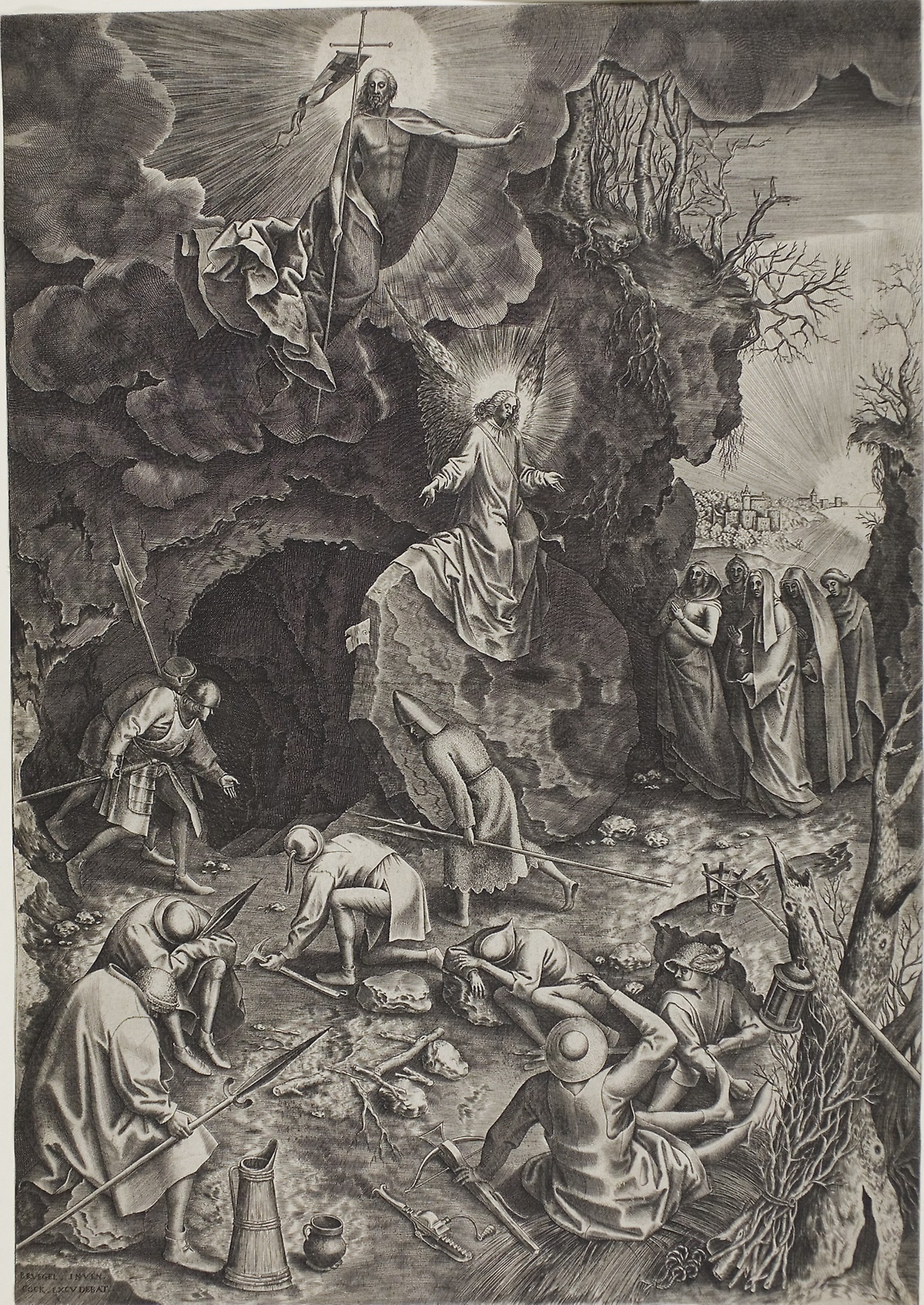
Christ being raised from the dead dieth no more; death hath no more dominion over him. (Romans 6:9)
Let us begin today with a question: Why are we here in church today? Many would answer something like, “Well, it’s Easter, and I usually go to church on Easter,” or “It’s Easter, and good people go to church on Easter,” these answers may be honest, but they are not terribly good reasons to give up all the other things we could be doing right now, and they certainly won’t ever motivate us to die and live in Christ. Obligation is a powerful force, but who wouldn’t trade grudgingly fulfilling a debt for love? Which brings us to a second question: Does God deserve our love? But, before you answer, look to your right and to your left, look at the ones you love and know that God will one day take them from you. The true God who kills and makes alive is not to be approached lightly; He is not to be loved lightly. The worship of this God is not an uplifting alternative to eating too much at brunch or sleeping in or watching TV; no, today we have come into the special presence of the God of life and death—the God who knit us together in our mothers’ wombs and lifts the lowly sparrow high above the earth. Terror would be an infinitely more fitting response than apathy—fear and trembling over indifference.
The plague which has swept across our world has brought some terror to our lives, reminding us of the ever-decaying human body’s true frailty: a reality earlier generations knew far better than us. It would be much harder to functionally pretend as if we were all going to live forever if our friends and family were dropping dead from Polio or Cholera, Spanish Flu or Typhoid Fever. COVID-19 has somewhat reminded us of this reality, but it is an open question as to whether our fallen world will learn any lesson from this judgment upon us. For make no mistake, this plague and all the many more we will experience in the years to come, are judgment: a fitting consequence of humanity’s rebellion against the Creator and Sustainer of life. The death you and I will experience, whether from the Corona Virus or old-age or an overdose are all a justified punishment for a humanity who looks at God and says, “I don’t need You; I can be my own god. I can have my own moral code, my own religion, my own way of living: I am in control, and I choose my desires to be my guide.” This is sin; it is everywhere, and so death is everywhere.
God answers humanity’s mad attempt to be our own god by giving us a taste of what it means to be on our own; He gives us what we ask for every time we sin against the divine order: He gives us death. We could be angry at this arrangement our fallen race has chosen, but we can’t be angry with its fairness. To try and cope with this reality, the underlying structure of our modern world is an insane kind of play where people act as if they are gods capable of changing the universe by the power of their wills even as they get colds and lose their car keys, eat too much and slip in the shower. We are not gods as every man and woman on their deathbed would tell us if we would listen to their voices rather than the voices of those trying to buy and sell our souls.
But, where we have created a playhouse of insanity, God has built a theatre of grace. I asked earlier why we are here today, but surely, the more important question to ask is, Why was St. Peter at the trial which led to his own crucifixion? Why didn’t he just deny that his publicly executed Lord had been resurrected from the dead rather than face crucifixion himself? Why didn’t St. John, a little faster to the empty tomb than his fellow apostle, deny what he saw rather than die in exile? What made these men, and the hundreds of other eye-witnesses who were gruesomely persecuted for their testimony, not only change their entire way of life in accordance with God’s Word but boldly stand before the false powers of this world to meet death singing the praises of the Living God? Grudging obligation doesn’t lead men to join Christ on a cross; grudging obligation doesn’t cause men to love truth more than their own lives. No, the men and women who first proclaimed, “Jesus is Lord,” even as the lions of the Coliseum devoured them, knew the truth we celebrate today: Christ is risen, death is defeated, and any force which opposes this truth must be fought as our Savior and King fought them.
Again, we may ask, “Why?” Well, because the historical resurrection of Jesus Christ was about more than one man coming back from the dead, as amazing as this event truly was; no, the resurrection of God the Son means the evil forces of this world have no power over us. What happened on that 1st Easter morning was more than just the resuscitation of Jesus Christ: He didn’t just wake up and get better; rather, Jesus was resurrected—transformed into a new type of physical existence: a living, breathing kept-promise come to life. The risen Christ is more than just a man back from the dead; He is the first member, the guarantee, of the inevitable new creation the Father has already revealed to us in the risen Son: the new way to be human where love and justice reign forever. Faith and trust in this new world is not some blind hope for the sake of comfort; no, faith and trust in the resurrection guarantees conflict with a world that would rather believe comforting lies than die in the truth, but within this conflict, within this cross-shaped life, we will be living for something more than a dream; we will finally be living for the world we were created to inhabit, the redeemed creation the God who is love is building first in our hearts and then in every corner and seam of this beautiful, broken world. The Resurrection of Jesus Christ is the great vindication of good over evil, the meek over the mighty, the righteous over the cruel. And, if we are God’s people, we too can march through this life already walking on resurrection ground knowing that nothing can separate us from the love of Christ.
I asked earlier if God deserves our love, and the Christian’s final answer to this question must be that there is no real love if it can be silenced by death, no real love if it ends in a hospital bed, a car wreck, or a death statistic on the news, and so God has destroyed death so that we might love as He loves. No, God doesn’t deserve our love; it is simply the case that true love is impossible without Him. May we then on this Easter Day find peace and purpose in the new creation Christ’s resurrection guarantees, may we love as those who have nothing to lose, and may every hour we have left be a hymn to the new world in our hearts and on the horizon: Christ is risen, Christ is risen, I am risen.

